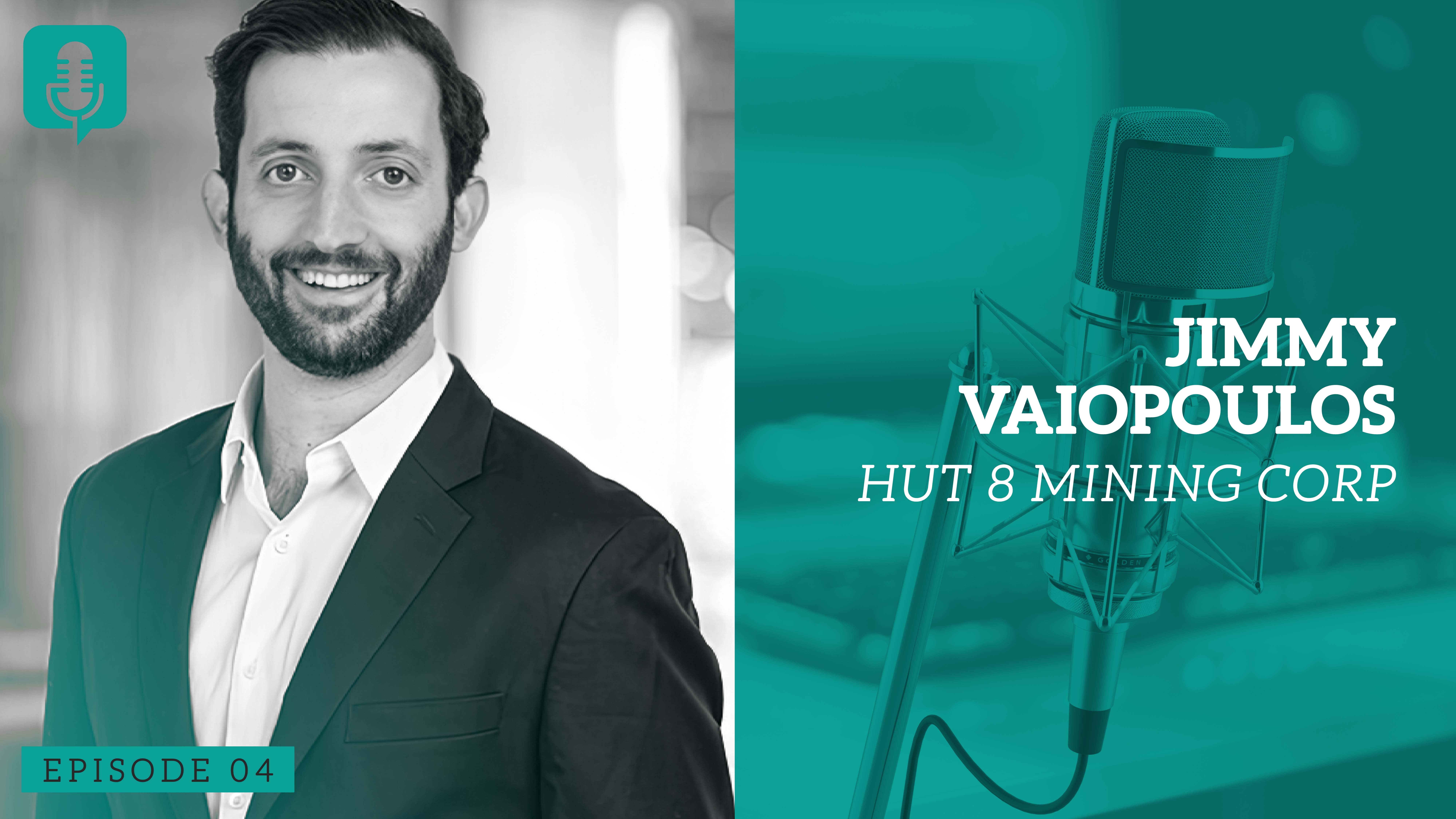The Bitcoin mining industry has rapidly evolved from an obscure niche to a multi-billion-dollar infrastructure backbone of the crypto ecosystem. In Episode 4 of The Sazmining Podcast, host Will Szamosszegi speaks with Jimmy Vaiopoulos, Interim CEO of Hut 8 Mining Corp, to explore how one of North America’s most prominent mining companies got its start, weathered massive volatility, and positioned itself for long-term success in an increasingly digital world.
From early investor skepticism to building state-of-the-art facilities, Hut 8’s story offers invaluable insight into how timing, strategic partnerships, and market understanding can turn a startup into a mining powerhouse.
From White Paper to Real-World Operations
Jimmy Vaiopoulos’s introduction to cryptocurrency began back in 2013, when the first Bitcoin ATM launched in Vancouver. Intrigued by the excitement surrounding Bitcoin, he dove into the Satoshi Nakamoto whitepaper and began understanding the fundamentals of blockchain. But it wasn’t until years later—after gaining experience in infrastructure, energy, and public mining companies—that he found his way into the crypto mining sector.
His background was especially relevant, given the energy-intensive nature of Bitcoin mining. Having worked in energy and traditional mining, he saw striking similarities between gold extraction and Bitcoin production—an analogy that would resurface multiple times throughout his career at Hut 8.
Hut 8’s Origin Story and Strategic Timing
Hut 8 launched in 2017 during the peak of the Bitcoin bull run. Institutional interest in Bitcoin was soaring, but most investors lacked the mandate—or the technical capacity—to purchase and secure digital assets directly. Hut 8 offered a turnkey solution by providing exposure to Bitcoin through public equity, backed by mining infrastructure and custodial holdings.
Vaiopoulos emphasized that Hut 8’s early success was a combination of:
- Perfect timing during the 2017 bull market
- A strong value proposition for institutions seeking Bitcoin exposure without holding it directly
- A compelling business structure, enabling flexible entry and exit through publicly traded shares
This timing enabled Hut 8 to raise over $100 million—an unheard-of figure at the time—and rapidly build large-scale mining operations.
Building the Backbone: Infrastructure and Innovation
Once the capital was secured, the challenge shifted to deploying it. Hut 8 focused on sourcing reliable electricity, securing high-performance mining hardware, and choosing a location with favorable regulatory and economic conditions.
Their flagship site in Medicine Hat, Alberta, was uniquely positioned:
- The city operates its own power grid, allowing Hut 8 to negotiate directly with the municipal utility
- Medicine Hat had recently built a natural gas power plant that was underutilized, creating a win-win opportunity
- The partnership included renting city land, paying taxes, and delivering reliable 24/7 electricity usage
For hardware and site design, Hut 8 partnered with Bitfury, which had extensive experience building modular mining systems using container-based designs with air cooling. Bitfury became both a supplier and equity partner, ensuring aligned incentives.
Scaling Responsibly in a Volatile Market
After launching operations, Hut 8 remained focused on two key priorities: modernization and resilience. Following the 2020 Bitcoin halving, the company raised an additional $8.3 million to upgrade mining equipment and diversify its supplier base beyond Bitfury.
Instead of being locked into one provider, Hut 8 transitioned to MicroBT and other manufacturers, ensuring flexibility and competitive pricing. Their modular infrastructure—initially built by Bitfury—was designed to be hardware-agnostic, enabling seamless upgrades.
This technical agility became especially important in 2020 when the COVID-19 pandemic introduced unprecedented volatility to both the global economy and the crypto sector.
COVID’s Impact on Bitcoin Mining
COVID initially created serious concerns for Bitcoin miners. In March 2020, capital markets and Bitcoin prices collapsed simultaneously. But as the dust settled, several favorable trends emerged for miners like Hut 8:
- Electricity prices dropped due to decreased industrial demand
- Remote work accelerated global adoption of digital assets
- Inflationary monetary policies led investors to seek alternative stores of value
These developments helped Bitcoin rebound sharply. Meanwhile, Hut 8 benefited from lower operating costs and increased attention from investors exploring inflation-resistant assets.
Bitcoin vs. Fiat: A Generational Shift
Vaiopoulos draws a clear connection between central bank money printing and the rise of Bitcoin. Governments around the world responded to COVID with massive monetary stimulus—driving down the value of fiat currencies and encouraging investors to seek assets with fixed supply.
Bitcoin, with its 21 million supply cap and decentralized architecture, emerged as a modern digital version of gold. But unlike gold, Bitcoin resonates more with younger investors who prefer digital tools and platforms.
In his words, “It’s becoming responsible to have some exposure to Bitcoin in your portfolio.”
Hedging vs. Full Bitcoin Exposure
Many institutional miners explore financial products like futures and options to hedge price volatility. But Hut 8 has taken a different stance.
Vaiopoulos explained that their investors want direct exposure to Bitcoin’s upside—and are comfortable riding the downside too. This philosophy mirrors that of gold mining firms, many of which abandoned hedging over time in favor of maximizing value during bull markets.
While Hut 8 continues to monitor derivatives markets, they currently do not hedge their Bitcoin exposure. Instead, they’ve focused on:
- Keeping a lean operating structure
- Maintaining cash reserves to weather downturns
- Setting up energy contracts with built-in flexibility
- Using “eco” and “full” power modes to optimize hash rate based on market conditions
This model allows Hut 8 to thrive in both bear and bull markets while staying aligned with shareholder expectations.
Lessons from the Gold Mining Industry
Drawing from his background in gold mining, Vaiopoulos sees similarities in how both sectors operate:
- Both require massive infrastructure and up-front capital
- Both rely on commodity price fluctuations for profitability
- Low-cost producers are best positioned to survive downturns
However, Bitcoin mining introduces a key difference: its role in securing a global, decentralized financial network. As such, he believes the sector will eventually take on aspects of a utility model, offering more stable returns, public dividends, and lower volatility as adoption increases.
The Future of Bitcoin Mining: Utility or Infrastructure?
According to Vaiopoulos, the long-term trajectory of Bitcoin mining could mirror that of traditional infrastructure sectors. As Bitcoin stabilizes and is embraced by governments, the role of miners may shift from speculative operators to critical infrastructure providers.
He predicts that future mining operations could be treated like:
- Data centers
- Energy utilities
- Infrastructure investment vehicles
But that future depends heavily on mainstream adoption, regulatory clarity, and Bitcoin’s use as a store of value and transaction medium.
Decentralization: The Ultimate Safeguard
One of Bitcoin’s core features is its decentralized architecture. But in practice, the concentration of hash power among a few large mining firms has sparked debate. Will mining become centralized or remain broadly distributed?
Vaiopoulos believes decentralization will continue because:
- Governments will seek to host mining infrastructure within their own borders
- National security concerns will encourage domestic hash power
- Market dynamics will prevent any single actor from dominating for long
Even if one company or country were to attempt a 51% attack, the transparent nature of the blockchain would expose the attack immediately—destroying any value in the process. Therefore, the incentives to remain honest are deeply built into the system.
What Governments Can Do to Attract Miners
Rather than heavy-handed incentives, Vaiopoulos believes governments should focus on:
- Creating clear and open regulatory frameworks
- Supporting reliable electricity infrastructure
- Encouraging innovation and competition
For example, Alberta has become a mining-friendly hub due to its openness, local power generation, and predictable rules. Jurisdictions like this will naturally attract miners who seek long-term stability.
The 10-Year Vision for Bitcoin
Looking ahead, Vaiopoulos envisions a world where:
- Bitcoin is widely held by individuals and governments alike
- Layer 2 solutions like the Lightning Network enable fast, low-cost transactions
- Developing countries adopt crypto to leapfrog outdated banking systems
- Major retailers accept Bitcoin natively, without relying on fiat conversions
- Bitcoin becomes a global savings tool—especially in inflation-prone economies
He draws inspiration from his time in Argentina, where inflation regularly eats away at people’s savings. Bitcoin offers a real alternative, especially for those outside the global financial elite.
Final Thoughts: The Quiet Revolution
Jimmy Vaiopoulos’s vision for Hut 8—and Bitcoin more broadly—is both grounded and ambitious. He sees mining as a critical part of a much larger societal shift toward digital money, personal financial sovereignty, and transparent systems.
Despite the daily volatility and noise in the media, the foundational growth of the crypto industry has been steady and undeniable. In just over a decade, Bitcoin has gone from a white paper to a global movement—and mining companies like Hut 8 are at the heart of that transformation.
As the industry continues to mature, expect to see more partnerships between miners, governments, and financial institutions, each recognizing the long-term potential of a decentralized, digital financial system.
Subscribe to the Sazmining Podcast
Enjoyed the episode? Don’t miss out! Subscribe to the Sazmining Podcast for more conversations with blockchain innovators and industry leaders.
Follow us on YouTube, X, and LinkedIn.
Discover all episodes at https://creators.spotify.com/pod/show/sazmining.
If you want to hear us interview a particular guest on a future episode, please reach out to us@podcastsamining.com.

